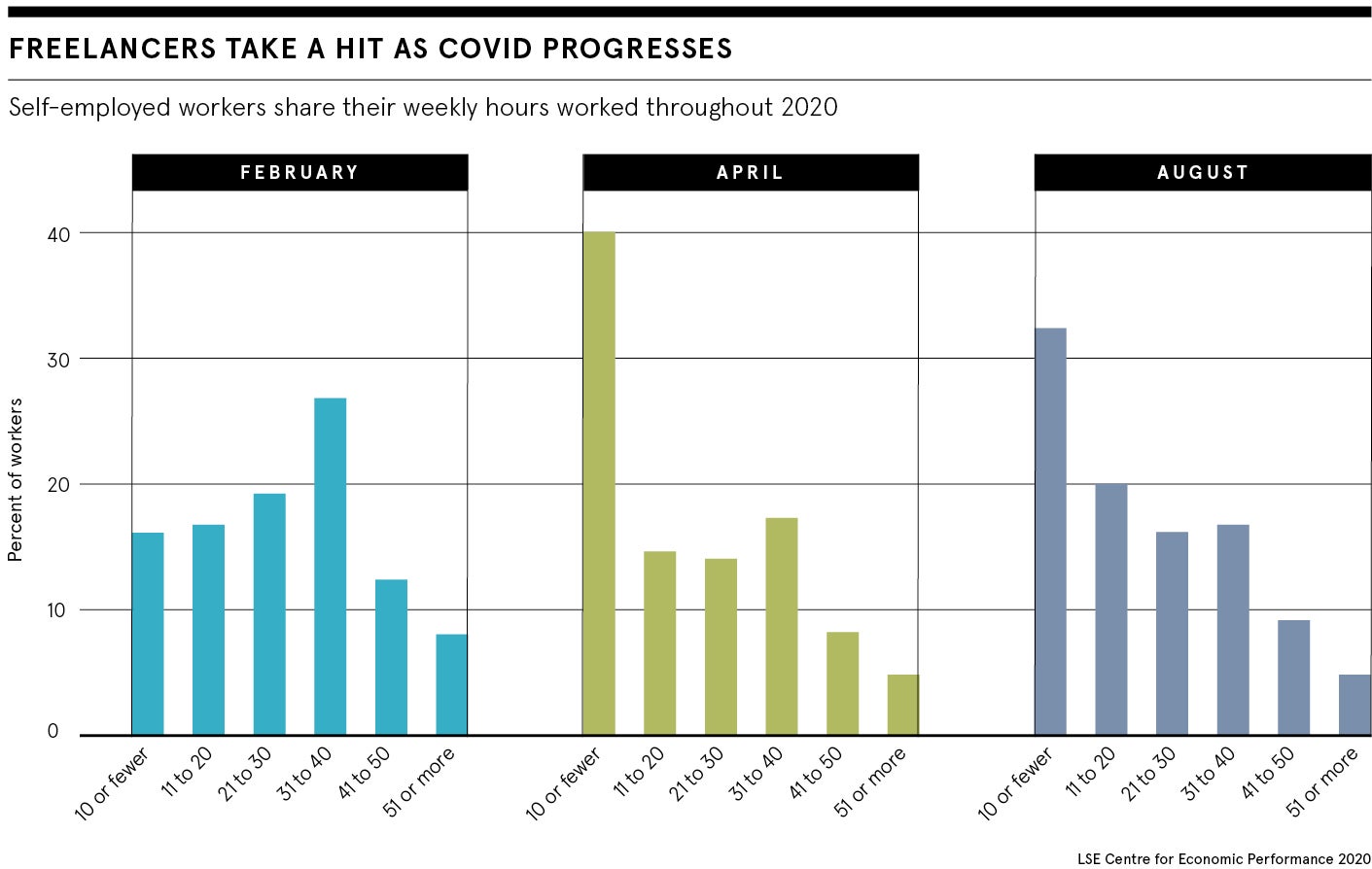
Often jilted at the first sign of trouble, the humble freelancer is the workforce’s poor cousin. According to the Institute for Fiscal Studies (IFS), the self-employed “appear to be an increasingly marginalised group”, subject to low, slow and sometimes no pay.
The IFS study, published in November, says coronavirus had made freelancers’ prospects even worse. Before the pandemic, average pre-tax earnings for those working for themselves during 2018-19 were 30 per cent lower than their employed counterparts.
If 2020 has taught the self-employed anything, it is that career planning is not solely the domain of those in the C-suite. Freelancers have hustled during lockdown, but as a consequence they’ve also had plenty of time to reflect and then retool, retrain and pivot.
Tackling imposter syndrome is crucial
“First up, freelancers should recognise they have an increasingly valid career path,” says Penelope Jones, founder of My So-Called Career, a company which offers career coaching for early to mid-career women.
“We sell ourselves short if we deny we are essentially CEOs of our little business of one. No CEO out there in the world would not have a sense of who their clients are.
“Who are the people that I want to work with? What are their problems that I can solve? And how can I ensure the people whose problems I can solve know that I exist?” These are just some of the questions freelancers must ask themselves.
We sell ourselves short if we deny that we are essentially CEOs of our little business of one
Jones says a creeping sense of imposter syndrome, which she describes as “a mind monkey”, needs to be constantly challenged.
This is achieved through a mixture of peers and mentors, what Jones calls a career community. “We must seek connections with other people with whom you can open up a conversation so you can challenge your mind monkey,” she says. “Nine times out of ten it is leading you down a bad path.”
Where so much of our wellbeing, rightly or wrongly, is defined through our success at work, Jones says she works with women to achieve harmony and balance, as well as develop their careers.
She reminds her clients to over-index on the bits they are good at, but says “real, true confidence also comes with self-acceptance which is, ‘I’m brilliant at this stuff. I’m crap at this stuff.’ And that’s fine”.
The importance of a positive mindset
Fred Pelard is a strategy trainer whose book How To Be Strategic is a mine of golden nuggets for freelancers. His first tip is to have ten tiny ideas rather than one big one. “Around seven are going to flop straightaway, two will show promise and one will work,” he says.
The next is to “flip and split” a question. “Don’t ask yourself, ‘How am I going to pay my bills in a year’s time’, because it will just raise your anxiety levels massively,” says Pelard.
“Instead say, ‘I’m going to have the best financial year in 2021’. You’ve immediately moved from a question to a story and it’s much easier to figure out how to get to the end of your journey. Just ask yourself, ‘What three things would need to be true for this positive story to happen?’”
For Pelard, who has trained 10,000 “alumni” over 20 years, the third tip is to “really dive into what it is that your customers want and don’t get”.
“When you’re a freelancer, you’re always working for a customer. And few people have a properly thought-through technique to spot the gap between what they produce and what the customers actually want. Close that gap and cash appears,” he says.

Making the most of free learning opportunities
Hannah Thomas, a freelance automotive public relations specialist and digital marketer based in East Sussex, was badly affected by the pandemic fallout. After three quarters of her work was cut at the start of April, she took accredited virtual courses in email marketing, social media techniques and content planning.
“It’s been really worthwhile and there have been some great resources available for free this year,” says Thomas, who initially qualified as a chef and has also had a successful career in event management.
“Looking back, this is the pause in life that many of us needed without realising: time to focus on your own business and personal development.”
Thomas, who has been passionately involved with the UK hotrod and drag racing scene, established HT Automotive PR in 2018. Her business helps niche automotive firms increase their brand awareness. As well as supporting clients, the position allows her to engage her “passion for custom, retro and modified cars”.
She warns that many businesses have jumped on the bandwagon, offering courses at ridiculous prices. “I choose the courses run by people who are active in the groups and networks I’m part of as they are more aware of the painpoints PRs and digital marketers experience.”
Joining online freelance communities can lead to job and networking opportunities in your sector. Perhaps most importantly, they also provide a safe space for freelancers to vent and celebrate wins too.
Meanwhile, critics of the government’s COVID-19 support measures say freelancers come in different guises and many have fallen through the gap. Among those adversely impacted are new freelancers who haven’t filled out a 2018-19 tax return, sole traders earning more than £50,000 and those who take their income as dividends.
Jones says that while there is a lot of structural help about seeking salaried employment and “a ton of support at C-suite or exec level”, there is far less out there for the self-employed.
“Freelancers should realise this isn’t a game. This is a career. This is my business. If we don’t think like that, no one else is going to think like that about us either,” she says.

Often jilted at the first sign of trouble, the humble freelancer is the workforce’s poor cousin. According to the Institute for Fiscal Studies (IFS), the self-employed “appear to be an increasingly marginalised group”, subject to low, slow and sometimes no pay.
The IFS study, published in November, says coronavirus had made freelancers’ prospects even worse. Before the pandemic, average pre-tax earnings for those working for themselves during 2018-19 were 30 per cent lower than their employed counterparts.
If 2020 has taught the self-employed anything, it is that career planning is not solely the domain of those in the C-suite. Freelancers have hustled during lockdown, but as a consequence they’ve also had plenty of time to reflect and then retool, retrain and pivot.





